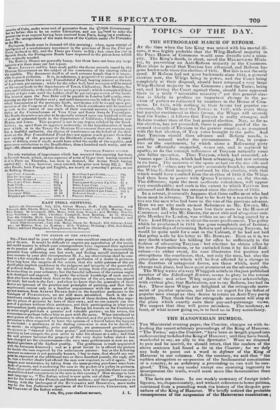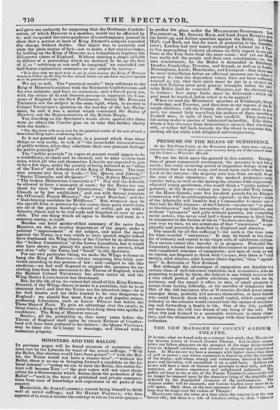THE HANOVERIAN HUMBUG.
THE Ministerial evening paper, the Courier, charges us with de- fending the recent arbitrary proceedings of the King of Hanover. "The Tories," says the Courier," have been at length piqued into endeavouring to defend the King of Hanover; and they have found, wonderful to say, an ally in the Spectator." Were we disposed to pun' and be uncivil, we should retort, that the readers of the above sentence had found a lie in the courier; for we defy any body to point out a word in defence of the King of Hanover in our columns. On the contrary, we said that "the sudden abrogation or suspension of the fundamental constitution of a country, is as arbitrary a proceeding as can well be ima- gined." This, to any reader except one straining ingenuity to misrepresent the truth, would seem more like denunciation than defence.
The facts are these. In our weekly summary of foreign intel- ligence, %ve,dispassionately, and without reference to home politics, continued from a preceding week the history of the despotic pro- cedure of the King of Hanover. We briefly noticed the probable consequences of the suspension of the Hanoverian constitution;
and gave our authority for supposing that the Germanic Confede- ration, of which Hanover is a member, would not be offended by it ; and we quoted the correspondence of a contemporary journal to
show that a portion at least of King ERNEST'S subjects regarded the change without dislike. Our object was to ascertain and state the plain matter of fact—not to make a few election-dupes, by holding up the King of Hanover as a hobgoblin to frighten the full-grown voters of Englund. Without uttering a single syllable in defence of a proceeding which we declared to he, on the face of it, as" arbitrary as can well be imagined," we concluded our half-dozen explanatory sentences on the subject by say ing- " It is clear that we must wait to see in what manner the King of Hanover means to follow up the blow he has struck, before we can form any just opinion as to its practical results."
We say so still. The "practical results" have reference to the King of Hanover's relation with the Germanic Confederation and his own subjects; and have no connexion, save a forced party one, with the choice of fit and discreet persons to represent the Com- mons of England in the New Parliament. Surely Mr. PouLerr THomsost saw the subject in the same light, when, in answer to Colonel THOMPSON'S question on the last day of the lute Parlia- ment, he said it was a matter which concerned the States of Hanover, not the Representatives of the British People. Yet, founding on the Spectator's words above quoted (for there were no other) the Courier goes on to take this further liberty 'with the truth— "The Spectator tells us to wait for the practical results of the acts of such a benevolent King before condemning him."
Is it not graceful and modest, in a journal which does these things so very coolly, to talk of "the remarkable inconsistencies of public writers, when they substitute their own personal feelings for public principle !" The "public principle" in vogue at present would appear to be a confederacy, to cheat and be cheated, and to utter certain cant cries, which all who call themselves Liberals are expected to join in for a few days, under the penalty of being hallooed at as "allies of the Tories" and defenders of the King of Hanover. The cant may assume any form of words—" The Queen and Liberty!" "Squire Thorneley and the Queen!" "The Reform Ministers!" "The broken Hanoverian Constitution I " Nor will the Liberals be allowed to have a monopoly of cants : for the Tories too can shout for their "Queen and Constitution," their " Queen and Church as by law established ;" and can with fervour execrate the O'Connell, Popish Ministry," the " cruel Poor-law," and the God-denying candidate for Middlesex." But, whatever may be the specific form or pretence for the nonce, these party watch-cries are all of the genus humbug—devoid of reality, got up with a delusive object, and to be laid aside and forgotten as soon as pos- sible. The one thing which all agree to dislike and treat as a common enemy, is truth.
Besides our brief matter-of-fact summary of the news from Hanover, we did, in another department of the paper, make a political " improvement " of the subject, and point the moral against the Tories, in a way which to have quoted, might indeed have displeased the Whig clients of the Courier by an allusion to the "broken Constitution" of the Lower Canadians, but it would also have shown too plainly for party trickery to pervert, what sort of an "ally " the Tories had "found" in the Spectator. For our own particular liking, we make the Whigs welcome to hang the King of Hanover—always supposing bins fairly con- victed according to due process of law : and—subject to the like condition—we feel well disposed to support the measure for ex- cluding him from the succession to the Throne of England, which the Radical Colonel THOMPSON has given notice of, and the Whig Doctor LUSHINGTON has threatened.
But, for the life of us, we cannot feel afraid of this King ERNEST, Granted, if the Whigs choose to make it a postulate, that he is an Incarnate devil, and that the Tories are his attendant imps—he is too well known and too little trusted to be very dangerous in England : we should fear more from a sly and popular prince, professing Liberalism, such as Louis PHILIP was before the Three Days of Paris. To gain an advantage over the 'staple, in these times, a King or Minister must first drug them into apathe:ic confidence. The King of Hanover cannot.
Besides, all the probability is, that many years before the Throne of England shall again be vacant, ERNEST of Cumber- land will have been gathered to his fathers : the Queen VICTORIA may be (may she be!) happy in marriage, and blessed with a numerous progeny.



























 Previous page
Previous page